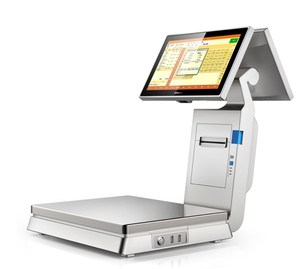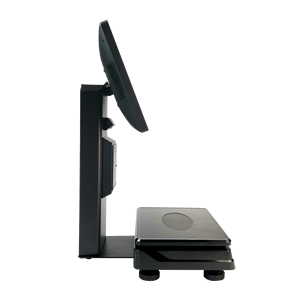
All categories
Featured selections
Trade Assurance
Buyer Central
Help Center
Get the app
Become a supplier

(2397 products available)



















































Scales for the POS system come in numerous varieties appropriate for multiple enterprises. Take a closer look at some of the various types.
Digital scales provide highly accurate weight readings. These scales use load cells to measure weight and display the result on a digital screen. Commonly used in retail, food service, and warehouse management.
Numerous industries utilize bench scales for tasks requiring larger or bulkier items. Often found in shipping and receiving areas. In these environments, scales manage inventory and package weight.
Unlike the previous fixed-position scales, hanging scales are portable and useful for weighing items suspended from a hook. In industrial settings, they are used to weigh large containers.
This type of scale is designed to handle heavy loads, making it ideal for industrial and commercial use. Floor scales weigh pallets and large bags, providing weight data for logistics.
Load cells convert the weight of an object into an electrical signal. They are often integrated into other measuring devices, providing the essential function of weight measurement.
This scale combines weighing capabilities with label printing. Retailers use these scales to quickly weigh items and print price labels, streamlining the checkout process.
For effective performance in diverse environments, POS system scales must be constructed from strong, resilient materials.
Use stainless steel as a primary material for commercial-grade scales due to easy cleaning, food safety, and corrosion resistance. Therefore, it makes sense that restaurants, grocery stores, and warehouses frequently use it. When used, it ensures long-term scale accuracy and durability.
Durable yet lightweight, aluminium is often used in digital and portable scales. The lower the strength, the more suited it is for mobile applications or environments where its users frequently change. Even though the material is light, it easily handles the heavy load and accurately measures weight.
Load cell housings and smaller digital scales frequently use high-impact plastic. This material is neither as tough nor as resilient as metal. However, it provides sufficient durability for retail environments.
The use of glass is in some countertop scales, mainly for aesthetic purposes.While not as durable as metal options, tempered glass scales are suitable for light-duty applications such as bakeries or delis.
Compared to other available options, this is less common. Industry-specific conditions requiring high stress and exposure to heavy weights frequently engage carbon steel. Examples include manufacturing plants' floor and bench scales. These scales are designed to handle particularly tough jobs.
The base of hanging scales incorporates rubber. This application reduces the impact of shock and vibration, which protects the load cell from damage. Both the scale and the weighing device last longer with this added feature.
The scales for POS systems have wide application in various businesses, enhancing operational efficiency. Let's explore the diverse scenarios.
Grocery stores need accurate pricing and inventory control, so they must have reliable scales to achieve this. These scales quickly weigh fruits, vegetables, and bulk items and print price labels. Therefore, this automation reduces human errors and ensures correct pricing.
They also need precision in ingredient measurement and product weighing. PST scales assist bakers in consistently measuring items and ensuring each product's weight meets regulatory requirements. Since the customer receives properly packaged goods, they feel satisfaction.
Both floor scales and bench scales are commonly found in warehouses and distribution centers. These scales check that packages and pallets are the correct weight before shipping. This practice improves accuracy and reduces mistakes at the shipping stage.
They use POS system scales to manage inventory. Retailers weighed items to assure the precise count and identification of the products. It ultimately integrated the weight into the inventory system, simplifying the stock updating procedure. To summarize, this implementation decreased manual labor and saved time.
Integrated scales are crucial in industries. Assembly lines place heavy reliance on load cells to measure material quantities. Precise weight measurement keeps production consistent. Hence, it avoids errors that impact product quality. Load cells will alert the operator if they add too much or too little of any product.
Ensuring quality and safety is a top priority when choosing a POS system scale. Sometimes, preventative maintenance, routine testing, and compliance with industry standards are mandatory for optimal scale performance measures.
This function guarantees the weight's accuracy by aligning the scale's readings with recognized weight benchmarks. It happens in grocery stores, shipping departments, and other busy workplaces where scales frequently change due to heavy use. OSHA requires scales be calibrated at regular intervals when the law demands accuracy.
Any weighing equipment that affects pricing or trade must follow national and local regulations. Businesses risk fines and legal action if they do not comply with these regulations.
The components inside the scale, especially digital ones, are often sensitive. However, companies can implement shock absorbers made of rubber or other materials to protect them. These measures ensure the scale continues functioning effectively, reducing the need for repairs or replacements.
POS scales frequently located in retail or industrial settings are susceptible to moisture and dust exposure. Therefore, look for scales with IP-rated enclosures that keep dust and water out. These measures help preserve the scale and lessen the chance of inaccuracy.
Emergency stop functions help safeguard the user and the instrument in settings with high-risk scenarios while prohibiting the addition of excessive weight.
Consistent cleaning and inspection of parts, such as load cells, preserve scale integrity. This is particularly crucial in establishments such as delis or warehouses, where debris, dampness, and other contaminants can injure the scales.
Selecting the right POS system scale involves several crucial factors. Here are the key considerations.
Before anything else, one should determine the maximum weight that any scale they want to purchase can handle. Grocery items do not need heavy-duty scales, but a warehouse will have scales that can measure bulk items. Getting a scale with the appropriate weight range is essential to its successful operation.
In other words, how much error can an instrument tolerate and still operate effectively? For example, a digital scale can measure the weight of an item down to the smallest fraction of an ounce. Choose a scale with the degree of precision suited to one's business. Abroker's scale will not suit a bakery's or a hardware store's scale.
The appropriate scale will depend on the business's circumstances. For instance, retail locations that require labeling frequently use printer scales embedded in the POS. Print the weight and price simultaneously to decrease the customer's wait time. As stated before, warehouse management prefers floor and bench scales over digital ones.
Another critical consideration is how well the scale can integrate with the existing POS systems. One must guarantee that the scale can connect with their current software to facilitate information transfer and real-time weight updates. Poor data input caused by lack integration might result in operational problems and increased customer dissatisfaction.
The new equipment's strength assures long-term dependability. Warehouse scales must be heavy-duty workhorses that can handle enormous traffic all day.
Retailers require the scales to be easy for the staff to operate. An intuitive interface will reduce mistakes and speed up the checkout procedures. Conversely, complicated measurements are tolerable in industrial scenarios.
A1.Yes, several modern POS scales include Bluetooth or Wi-Fi connectivity. They enable seamless communication with POS systems, reducing cabling and making setup more adaptable.
A2.The scales should be calibrated frequently—ideally, every three months or more often in high-volume situations. Scales weighing bulk items should be calibrated at least once a month.
A3.Since most outdoor jobs involve harsh temperature or unsafe working conditions, it is better to use indoor-friendly scales.
A4.Excess weight, uneven terrain, moisture entry, and poor load cell condition all contribute to inaccurate measurements. Regular maintenance and proper usage can help avoid these issues.
A5.Consider precision, size, material, load cell type, and compliance with regulations when selecting the industrial scale for any business. The best scale fits seamlessly into the workflow and meets the weighing needs efficiently.